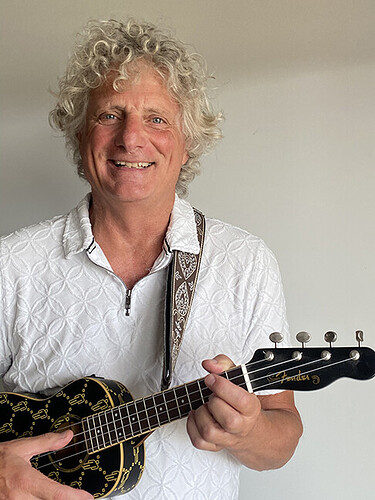Paul Stacey and his ukulele CC BY-SA
Hi I’m @paulstacey inviting you to Reimagine Open at the Crossroads through music.
For background context please read the Reimagining Open at the Crossroads Introduction. This activity builds on the work of Catherine Cronin and Laura Czerniewicz whose essay “The Future isn’t what it used to be: Open Education at a Crossroads” has a five part action framework for moving forward from the crossroads.
For this activity I invite you to submit one to three songs that have personal open education meaning to you and respond to Catherine and Laura’s five part framework in some way.
In submitting your songs please provide:
- the name of the song
- the name of the artist or band who play the song
- a link to the song online (As a suggestion @cogdog identified a really nifty web service called On Demand Smart Links where you can search for a song and it provides all the places it is available. It also gives you one song link that you could use.
- a link to lyrics online (another @cogdog suggestion)
- your remarks on which of the five calls to action the song responds to and why the song has personal open education meaning for you
Original songs and songs that are openly licensed are especially welcome. However, any song can be submitted - from any country, in any language including songs not openly licensed. The aim here is to share the many ways songs connect in personally meaningful ways with open education. Everyone is welcome to submit songs whether you are attending the OEGlobal 2024 conference or not. A playlist of all the songs submitted will be created for the OEGlobal 2024 conference.
As an example, and to get things underway, I submit two songs:
Paul’s First Song
Name of Song: Open The Door (To Your Heart)
Artist: Van Morrison
Links: Music / Lyrics
Remarks: There is a verse in this song that for me conveys both open protest and celebration responding to Catherine and Laura’s challenging and resisting call to action. It goes:
“Money doesn’t make you fulfilled
Money’s just to pay the bills
It’s need not greed
Open the door to your heart”
Paul’s Second Song
Name of Song: The Sharing Song
Artist: Raffi
Links: Music / Lyrics
Remarks: Raffi is a Canadian children’s song troubadour. His songs were loved by my kids when they were growing up. In my view the core verse of The Sharing Song conveys the essence of open and in doing so makes a claim about what a just, humane & globally sustainable open education effort entails. It goes:
“It’s mine but you can have some
With you I’d like to share it
'Cause if I share it with you
You’ll have some too”
What songs invoke protest, joy, inspiration, or the essence of open for you? Simply Reply to this post to submit your song(s).
